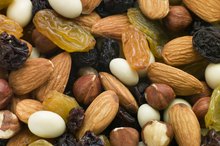Diet for Duodenal Ulcers
A duodenal ulcer is an open sore found at the beginning of your small intestine, a site referred to as the duodenum. Infection with bacteria called Helicobacter pylori and long-term use of nonsteroidal antiinflammatory medications -- such as aspirin or ibuprofen (Advil, Motrin) -- are common contributing factors to duodenal ulcer formation. Treatment is medically focused and typically includes antibiotics and acid-suppressing medication. There is no evidence to support that dietary choices promote duodenal ulcer healing, but some diet modifications may ease your symptoms.
If you are experiencing serious medical symptoms, seek emergency treatment immediately.
Diet for Symptom Management
Alcohol irritates to the lining of the stomach and duodenum and slows the passage of food through your digestive system. These effects may interfere with ulcer healing. Therefore, most doctors recommend avoiding or limiting alcohol if you have an ulcer. Other dietary changes related to duodenal ulcers are based on your personal tolerances. Eating smaller meals limits stretching of your digestive organs and may prevent discomfort. Keeping a food journal can help you identify and avoid foods that provoke or worsen your pain. Common offenders include caffeine, pepper, garlic, chili powder and highly acidic foods, like citrus juice or tomato sauce.
When to Call Your Doctor
Foods to Avoid With Esophagitis
Learn More
Complications can occur with a duodenal ulcer that can be dangerous. Potential problems include bleeding, the development of holes in your duodenum or an intestinal blockage. Contact your doctor immediately if you experience severe abdominal pain, dizziness or fainting; your stools are bloody, black or tarry; or you're vomiting blood. Also be sure to contact your doctor if your symptoms are not improving or worsening.
Related Articles
References
- American Family Physician: Peptic Ulcer Disease
- Nutrition and Diagnosis-Related Care, 6th Edition; Sylvia Escott-Stump
- Alcohol and the Gastrointestinal Tract; Manfred V. Singer and David A. Brenner
Writer Bio
Jill Corleone is a registered dietitian and health coach who has been writing and lecturing on diet and health for more than 15 years. Her work has been featured on the Huffington Post, Diabetes Self-Management and in the book "Noninvasive Mechanical Ventilation," edited by John R. Bach, M.D. Corleone holds a Bachelor of Science in nutrition.









